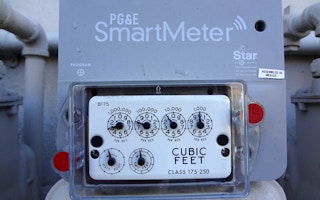Love them or hate them, smart meters are becoming increasingly common around the globe. Advocates believe that the meters generate better data for both energy consumers and service providers. Meters provide homeowners with feedback on their energy consumption, which helps them change their habits in order to reduce monthly utility bills. Critics, however, have voiced concern over health and safety issues, asserting that smart meters present fire hazards, emit dangerous levels of radiation, and violate privacy.
To continue reading, subscribe to Eco‑Business.
There's something for everyone. We offer a range of subscription plans.
- Access our stories and receive our Insights Weekly newsletter with the free EB Member plan.
- Unlock unlimited access to our content and archive with EB Circle.
- Publish your content with EB Premium.
The smart meter system is comprised of wireless, two-way monitors that capture and store data about energy usage. Although primarily used for electricity usage data, smart meters are also being used for other utilities like gas and water. The meters used for utilities other than electric provide the same benefits to consumers, allowing them to monitor their usage and reduce their monthly bills. Once the meter is placed on a home and activated, the consumers have virtual access to their usage.
Data tracking for utilities begins at a per hour view and goes up to monthly overall usage. Customers now have data that tells them what their peak hours are for energy consumption, which means that they can be conscientious about reducing their energy usage during said hours. It runs on a supply and demand model, which allows the customers to adjust their usage depending on how much they are willing to spend.
The utility providers are providing further incentives to reduce energy usage: if energy usage is at its peak in the evening, rates will go up at that time to compensate for the extra pressure on the electrical system. Utility companies hope that this it will cause users to make changes so they use more energy during non-peak hours, which would result in a lower rate for the user and less stress on the system.
Smart meters have proven to be especially popular in energy deregulated states in America where users are free to choose their own electricity provider – here, a smart meter can let them save even more money. Companies like IGS Energy in Ohio and BrightSource Energy in California not only use more renewable sources of energy and allow customers to choose how the electricity they buy is generated, but offer their customers a way to double up on their eco-friendliness by adjusting their energy usage according to the smart meter data.
Given the number of high profile hacking cases across the globe, many worried citizens have expressed concern over the security of these smart meter systems. This isn’t just a matter of concern for North Americans, either; given the growing popularity of smart meters in Asian countries like China and the Philippines, the pressure is on companies to make sure the smart meters and the information they gather is secure. Given the vulnerable nature of wireless systems, and the increasingly savvy hackers from all corners of the globe, many are concerned that hackers could easily steal smart meter data.
“
Given the number of high profile hacking cases across the globe, many worried citizens have expressed concern over the security of these smart meter systems. This isn’t just a matter of concern for North Americans, either; given the growing popularity of smart meters in Asian countries like China and the Philippines, the pressure is on companies to make sure the smart meters and the information they gather is secure.
Smart meters give incredibly specific information that goes beyond merely noting when electricity is and isn’t used. Hackers can pinpoint it down to which device using energy in which room. They can even turn the power off to the home or business, rendering it, and any alarms in it, vulnerable to attack. This issue is of particular concern for business owners who are putting their money, property, and inventory at risk in some cases.
It’s not just that vulnerability that concerns users, either — it’s the fact that the information the energy company stores about consumers’ usage can be used against them in criminal investigations. For example, a law passed in California in 2011 which required annual transparency reports from utility companies. In 2013 alone,, San Diego Gas & Electric gave the energy usage information of over four thousand of its customers to law enforcement agencies without the customers’ knowledge, raising major ethical and legal questions. The fact beyond that is that many states and many countries don’t have laws requiring privacy, meaning any official who wishes to access the highly detailed information stored by your smart meter can get it.
These are somewhat extreme examples, and smart meters can genuinely do good, particularly in monitoring and reducing energy use. The reality of the matter is that they aren’t fail safe and until they’re proven to be, the concerns will remain. We live in a time where privacy of information is an increasingly rare thing. While we expect the insignificant details of daily life, such as when we watch a DVD or when our last employee turns off the lights, to remain our knowledge alone, that is not necessarily the case.
Aid from the government, such as the U.S. Department of Energy’s Voluntary Code of Conduct (VCC), helps ease consumers’ minds about privacy concerns. The VCC requires utility companies to enact departments of trained employees who will monitor meter security. Employees will be trained to prevent and counteract cyberattacks and leaked information. Governing smart meter privacy is one large step toward safer usage, although, ultimately, the manufacturers need to make it their imperative to adequately address privacy issues; making smart meters safer (and therefore, viable in the long term) is in their best interest from a business standpoint, and it’s in the consumers best interest from an ecological standpoint.
Emma Bailey is a writer in the greater Chicago area who covers technology, entertainment, and business. This article was written exclusively for Eco-Business.


















